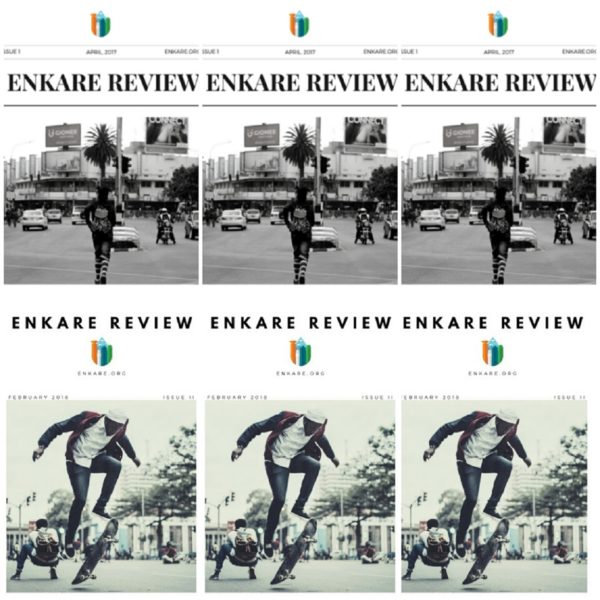
The Enkare Review Collective released a statement yesterday regarding the erasure of the website. This is Troy Onyango’s statement in response.
‘audi alteram partem’
One wonders, if I may begin this way, why anyone would have the idea for something, spend hours and hours building it, dedicate all their energy to it, then ruin it. It would be tantamount to a rabid kind of madness. In the past few days, I have been accused of exactly that with regards to Enkare Review. However, this accusation has been shrouded with contradictions, half-truths and lies meant to manipulate someone into thinking that I would indeed set out to do so.
Beginnings
On the founding of Enkare Review: sometime in July 2016, I texted Carey Baraka. A simple message that would have a bigger effect than I had imagined. I told him: Oya! Let’s start a litmag. He references this in his latest interview with Africa in Dialogue. This, the idea of a literary magazine, was something I had been thinking about for a while, and I had talked to the founders of other literary magazines just to get a grasp of how it worked. I was 23 at the time with no idea of how to run a litmag, and so I thought, if I was going to do it, I had to have someone who shared in my enthusiasm and vision. Together, we’d formulate a plan on how to get a platform where we would curate content for Africa, from Africa, with Africa in mind. I remember telling Carey that we would create “the Granta and New Yorker of Africa.”
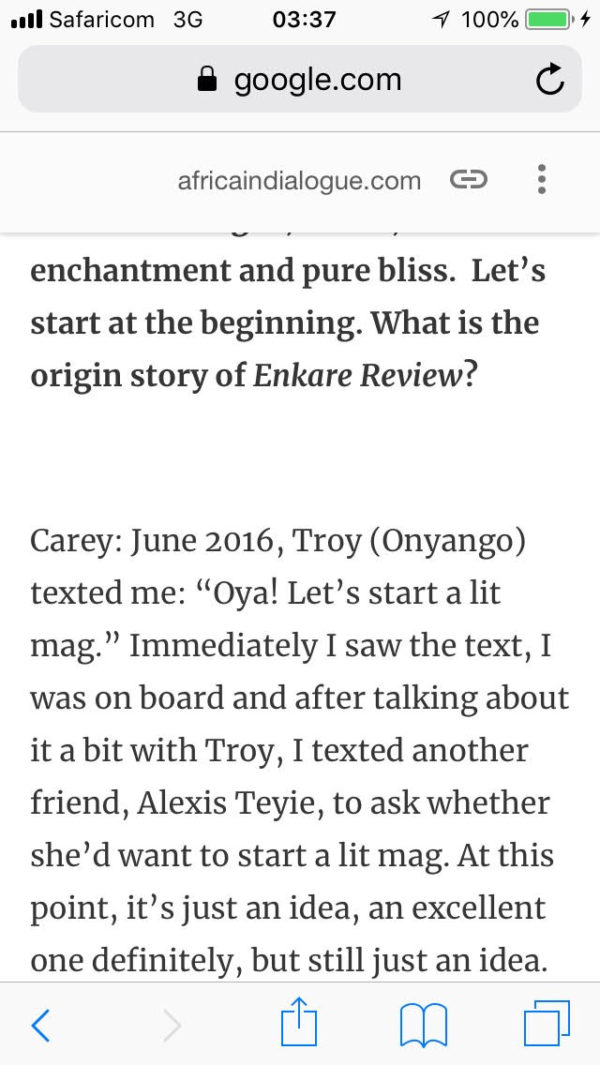
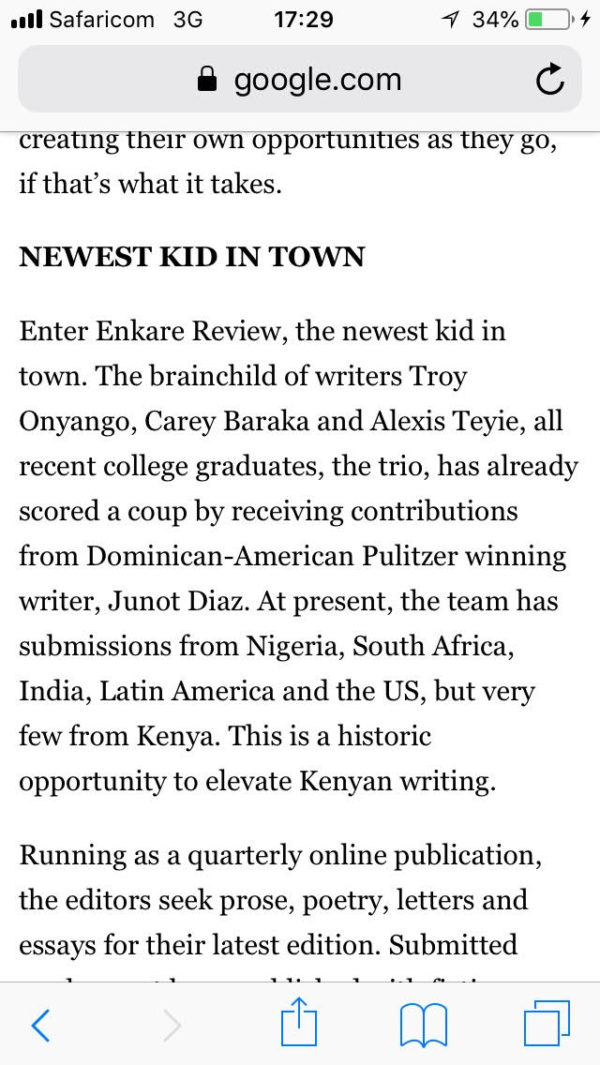
Carey was on board. He was happy about it. He told me he had a friend who’d want to be on board too. Alexis Teyie. I had admired Alexis for the work she had done in various spaces and I was certain she would be a brilliant—perfect even—addition to this project. We met, with other creatives who had expressed interest in joining us, and we decided to create a WhatsApp group to work on our plan. After trying out several names with no success, I did my research about the origins of Nairobi and came across the name “Enkare.” I forwarded it to the group and it was unanimously agreed that the project would be named “Enkare Review.”
Workings
If I am to be honest, at first I didn’t know what we would do with this project. Now that it was here, it was scary. We had a name, I had gotten the website guy to build one, I had spent hours designing it, but now, what next? I wrote a review of the Writivism Prize shortlisted stories. When Chuma Nwokolo came to Nairobi, I did an interview with him and thus we began.
We were thrust into the limelight prematurely though when Junot Diaz agreed to have us publish his story. We were star struck by the possibility of publishing a Pulitzer-winning writer. Sanya Noel, who had just joined us, edited the story and I posted it on the website. We weren’t ready. Doors had opened. Stories kept coming more than we could manage. People got overwhelmed. Some left, others stayed. We had to stay afloat.
Issue I of Enkare Review was due and the team was already overwhelmed. I remember clearly reading the whole fiction batch with Florence Onyango, and Alexis, who was unwell at that time, was the only one in the poetry section. I solicited poetry submissions from two friends of mine as there was barely enough time. With Carey, we stayed up till 3 a.m. to edit and upload the issue while Sanya worked remotely. It wasn’t easy at all. I fell ill two days after that but I was satisfied with the work we had put out. The issue got wide attention and favourable reviews.
Setbacks
Our first moment of trial by fire came when one of our editors was accused of plagiarism. The more the accusations surfaced, the harder our ship rocked. He did not offer us any explanations. We had to bundle together and ward off this setback as a team. We released a statement and, as the then Managing Editor, I posted it on Facebook. We survived. But that was not to be the only one.
Our web system kept crashing and we had emails, submissions and posts falling through the cracks. I spent hours with the website manager and due to the large volumes of submissions (a good thing, actually) we couldn’t work out how to stop it. So I created a new submission system that would store the work on both the website and the email. It helped. But the issue with the posts still couldn’t be resolved. The whole team was aware of this.
Departure
Everyone has been told that I left Enkare Review. No one has said, however, the circumstances under which this departure happened. No one has said how one Carey Baraka, after a disagreement, called the person managing the website and told him that I had had a mental breakdown and I should be locked out of the system. In an email dated 25th July 2017, Carey says, “Aside from one thing. I did imply to Joe that Troy was having a breakdown, and for that I apologise.” I had trusted him with my mental health as one confides in a friend they trusted. Instead, he used that same trust to manipulate my being locked out of Enkare Review. Afterwards, my name was removed from the masthead, a neatly calculated move at erasing all the contributions I had made towards Enkare Review. My mental health did not in any way affect my capacity to be a part of Enkare Review. I wasn’t upset at the time, just disappointed and somewhat downtrodden, and I handed over the logins—that is what has been referred to in the email screenshot they provided.
Partnerships
Regarding the partnership with Writivism to publish the Koffi Addo Nonfiction Prize stories, I did reach out to the editor at Writivism and secured the partnership way before I “left” Enkare Review and made everyone who was in Enkare Review at the time aware of it. Everything around Writivism, including my invitation to their festival, happened before my departure. I paid my own bus fare to the festival and talked about my role as the founding editor. This was not a misrepresentation as the panel required only that of me. As such, they were fully aware of my attendance and participation at the festival. To claim otherwise, as they have, is untrue and meant to tarnish my name and to claim that Writivism did not conduct due diligence. The conversations around the festival and the partnerships happened in full glare of the team.
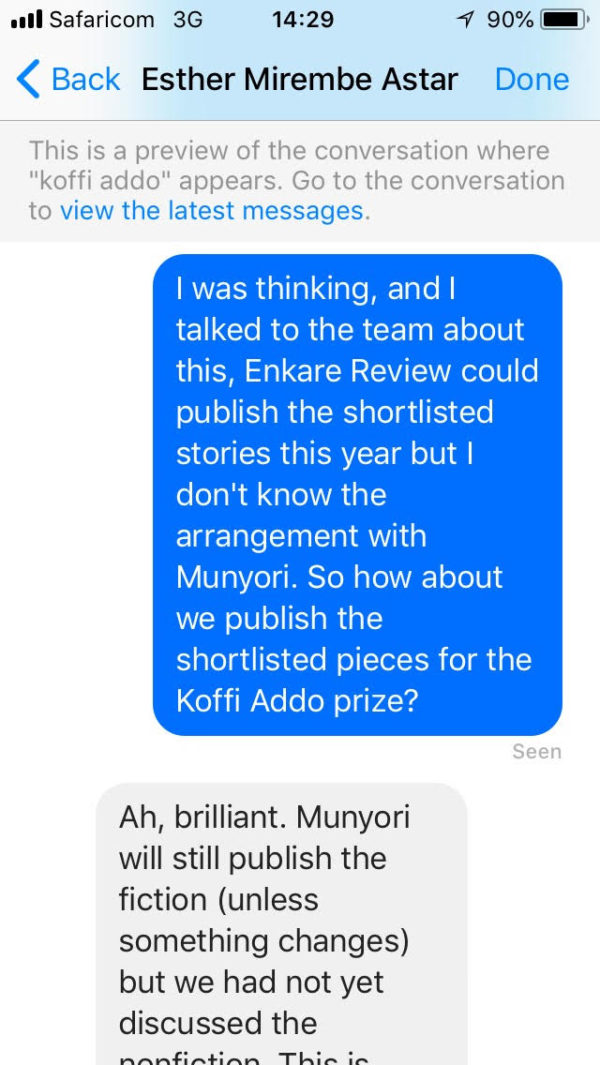
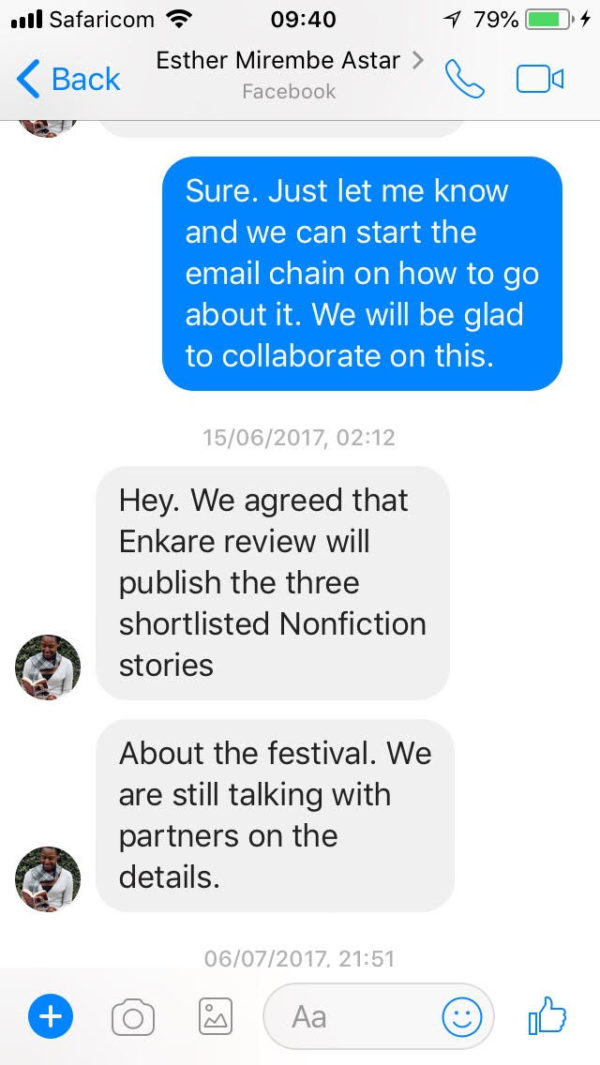
I also managed to secure a partnership with Ake Festival when I was introduced to the organisers by a writer friend of mine. We agreed to publish conversations happening around Ake Festival and do book reviews for the publishing house. A copy of one of their books was delivered to me and I handed it over to Carey who did not write a review until a year later.
Regarding Africa Writes, I was indeed invited to the festival. I did not misrepresent facts to them. I agreed to the panel because I was going to speak at the festival on my role as the founder/founding editor. I tried to talk to Carey about the partnership after I came back from the Caine Prize Workshop but, again, communication was being frustrated. I tried to set up a meeting before leaving for the residency in Nigeria but nothing. It is not that he or the others were not aware of the existing communication; it is that they wanted to have me pulled out of the festival with malicious intent. Since they claim in their statement that “we then believed that even while not being on board, Troy Onyango had good intentions for Enkare Review and that he would represent the spirit of Enkare Review in the best way he could,” why then, suddenly, couldn’t I be trusted with doing the same in London as the founding editor? Was it because of the location? They acknowledge that my representation at Writivism earned them a fruitful partnership as a result. So why would they frustrate a partnership with Africa Writes when they claim the circumstances were similar? If they felt uncomfortable with me sitting on a panel to speak as a founding editor, why wouldn’t they send an email to me and ask me to withdraw from the panel? Why would they not respond to attempts at clarification? If, as they say, they stand for “collaboration, openness, generosity and thoughtfulness,” why would they not simply send an email or agree to a meeting so that we could both extend to each other these if they believe, truly, in the sense of community?
I leave that to you, dear reader.
Misogyny/Misogynoir
I have been accused of, among other things, misogyny, of trying to silence the voice of womxn and causing them harm. By virtue of being and identifying as a cis-male, I am aware of the systemic kinds of violence and oppression that have been perpetuated by men against womxn throughout history. I cannot defend myself against a person claiming I have subjected them to the same harm/violence, as the primary instinct (including for me) is to believe the victim. However, it would be good (decent, even) when the people who make such accusations could substantiate those claims, as something like this, without evidence, could leave room for speculation without any resolution. This, therefore, is a plea to any womxn that I have hurt to come forward and I will bear the consequence of my actions. I acknowledge the importance of #MeToo and #TimesUp as I have seen it bring forth conversations around sexual abuse and violence.
One of the former fiction editors has stated that I sought to silence her when I said she should “stand down” when she had a disagreement with both Carey and Sanya. While I did tell her this, I sent the same message to Carey and Sanya because it was in the interest of Enkare Review that the conflict did not escalate so as to interfere with the output. Screenshots sent to me by Sanya and Carey had shown a nasty exchange between them. Not intervening, as the managing editor then, would have led to worse consequences. Due to the geographical differences (South Africa-Kenya), we could not set up a meeting to talk about it in person. It is unfortunate that she walked out without getting the matter resolved and continues to believe that my intentions were to subjugate her as a womxn. It was not that, and if anything, my caution to Sanya and Carey in possibly the same tone should have shown that. I would have still wanted to pursue reconciliation.
(Non) Communication
Often, I tried reaching out to Carey Baraka to communicate things regarding Enkare Review. At all times, I have been met by either non-communication or curt responses. I have requested for an email conversation or to meet the team but he has deliberately frustrated the efforts up until the time of writing this response. Some of the issues raised could have been resolved by email or a simple meeting attended by the team members. I messaged him to clarify the position with Africa Writes and I was met with a brief response that served to move the conversation nowhere.
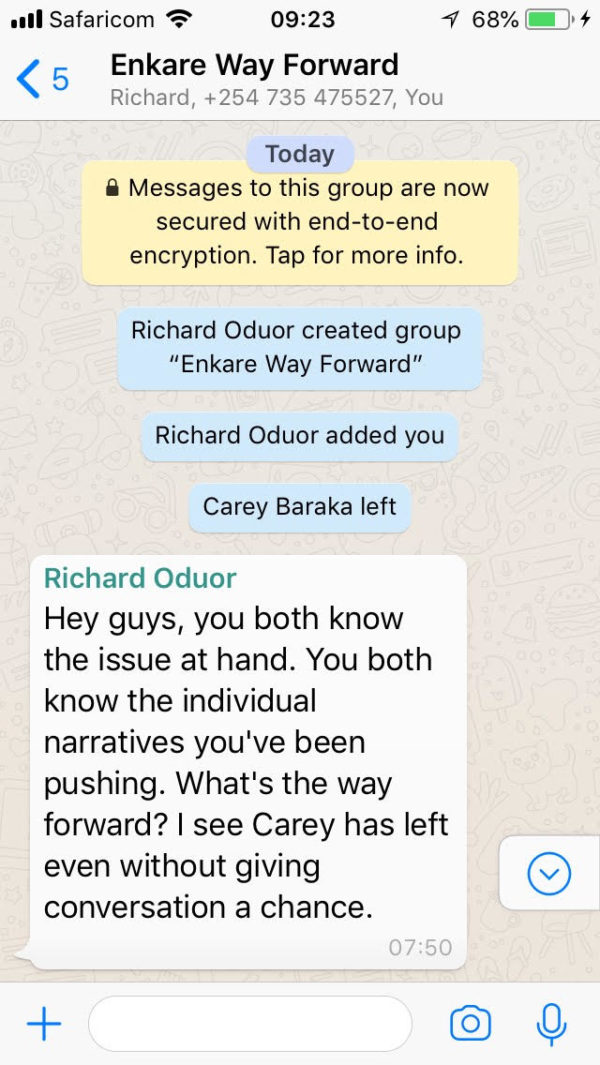
Erasure
I have been accused of the erasure of both the website and work by other writers. The website has not been taken down and a look at it shows it is up and running. I did access the website using logins obtained legally and the work is still up.
One of the things I ensured there was at Enkare Review was a permissions agreement for the work of the writers. This was essential from the onset and the permissions are obtained for AND on behalf of Enkare Review. If, however, one feels that due to the differences, they would not want their work on the website anymore, I am obligated to release the work back to the writer in the spirit of utmost good faith. I have been reaching out to the writers privately to ask if they would still want the permissions granted to subsist until such time that this is resolved.
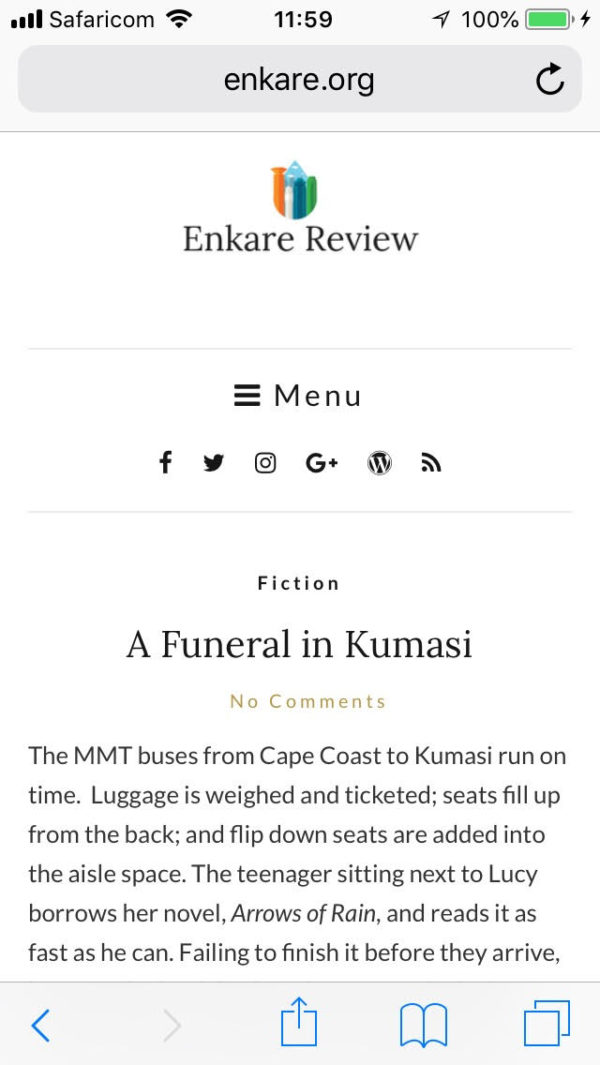
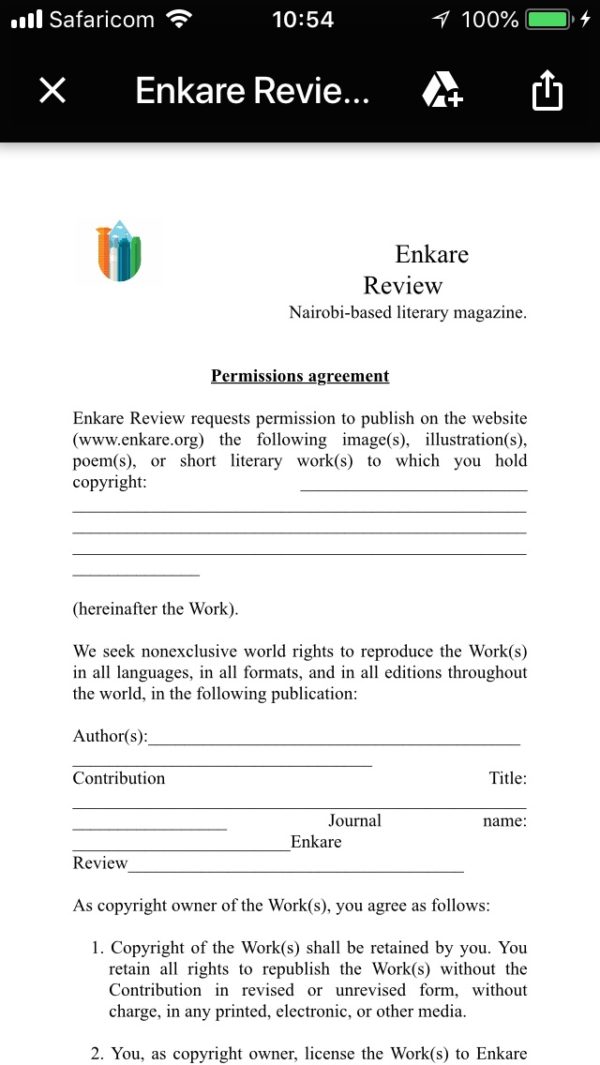
One of the points of conflict was having editors publish their own work on the platform, and the team was divided on this. It was, in my opinion, not ideal to have editors publish their work on the same platform instead of giving space to other voices. This was in order to protect the integrity of submissions and to ensure that the platform achieved what it set out to.
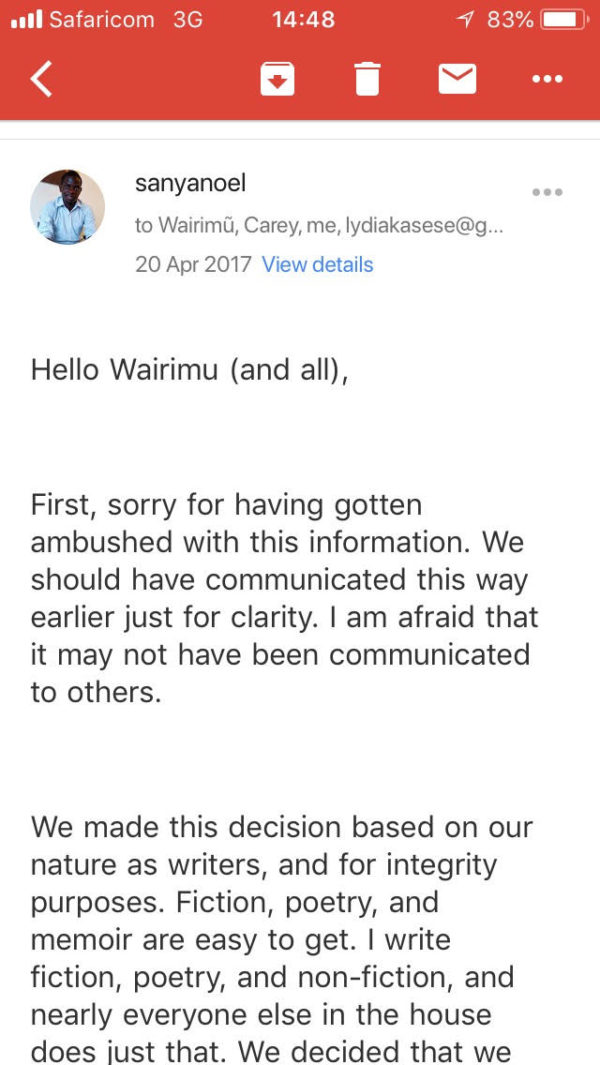
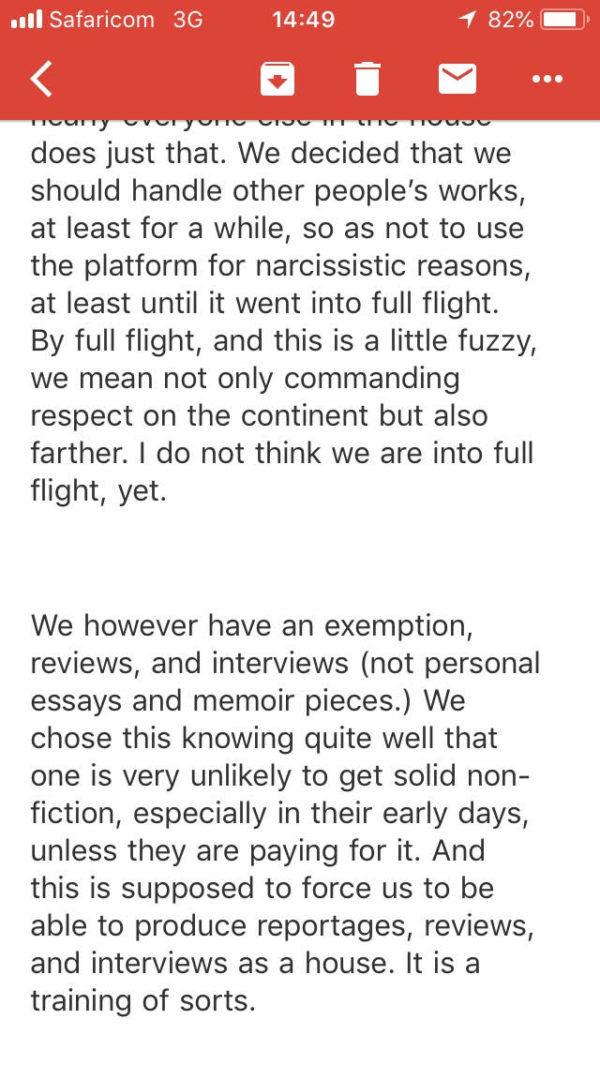
Output
I have constantly received messages regarding the output of Enkare Review being on the decline since I left. This has ranged from no responses from the editors to several delays in putting up the work. I have often felt helpless when a writer sends me a message about their bad experience with Enkare Review as I am always unable to help.
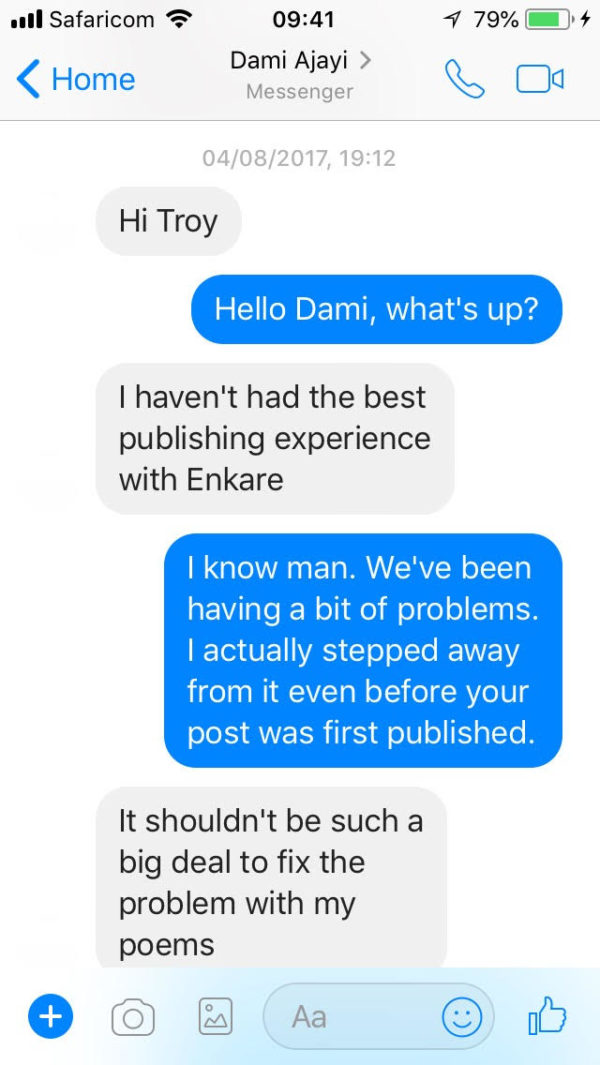
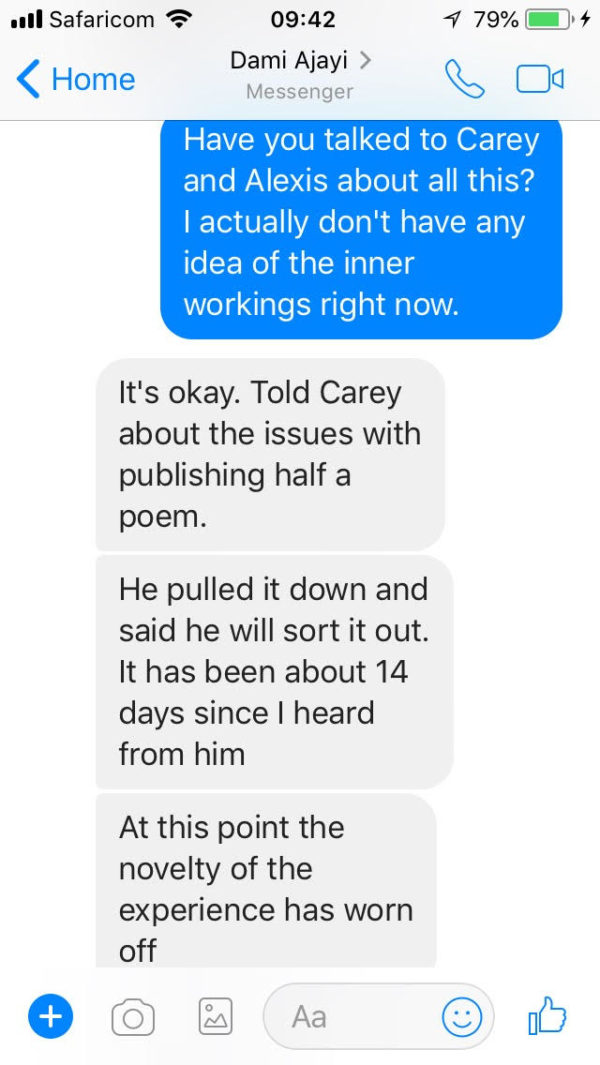
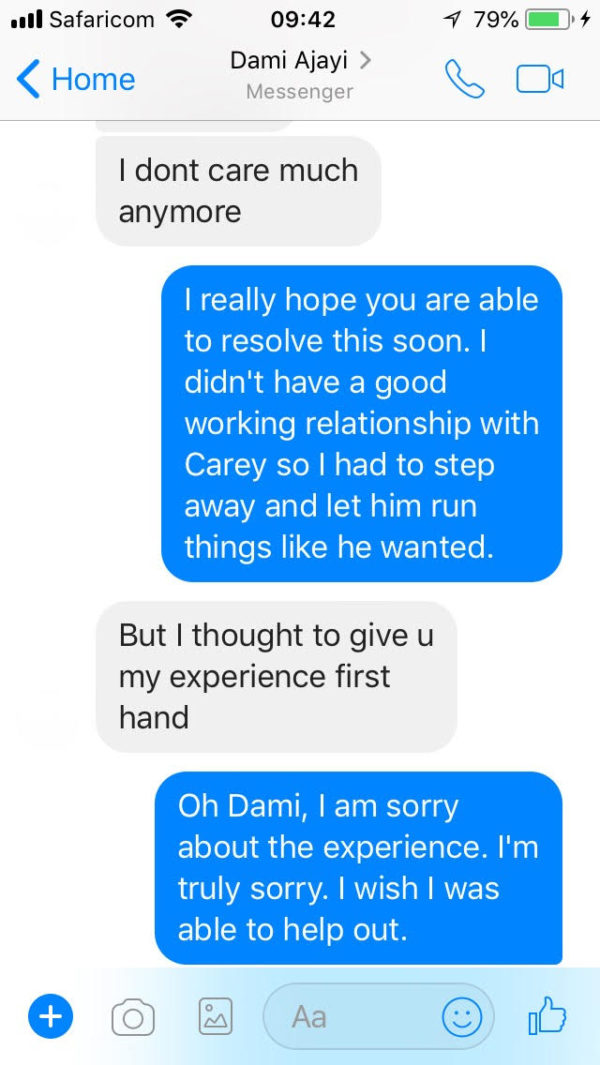
Legality
The current ownership of the website has been mentioned as a possible legal issue. I paid for the domain (enkare.org) the first year, not on behalf of Enkare Review but as part of renewing my ownership of troyonyango.com, which is my personal website. The agreement was to have the website paid for every year in January. As of last week, the domain hadn’t been paid for and the website manager confirmed non-payment. I paid for the renewal and he acknowledged that. For this then, the domain ownership is legally mine and I am able to defend this anywhere.
Smear Campaign
I have been the victim of a smear campaign on Twitter meant to tarnish my general reputation and disposition, something I would not wish upon anyone. People who barely know anything about me or Enkare Review or even the chronology of events leading up to this moment have made disparaging statements that are meant to show me in bad light. To what end? Only they know. I could choose legal action against them under our defamation laws, but I have learnt how social media works to pit people against each other even when they have no idea of the events or the person. Especially then.
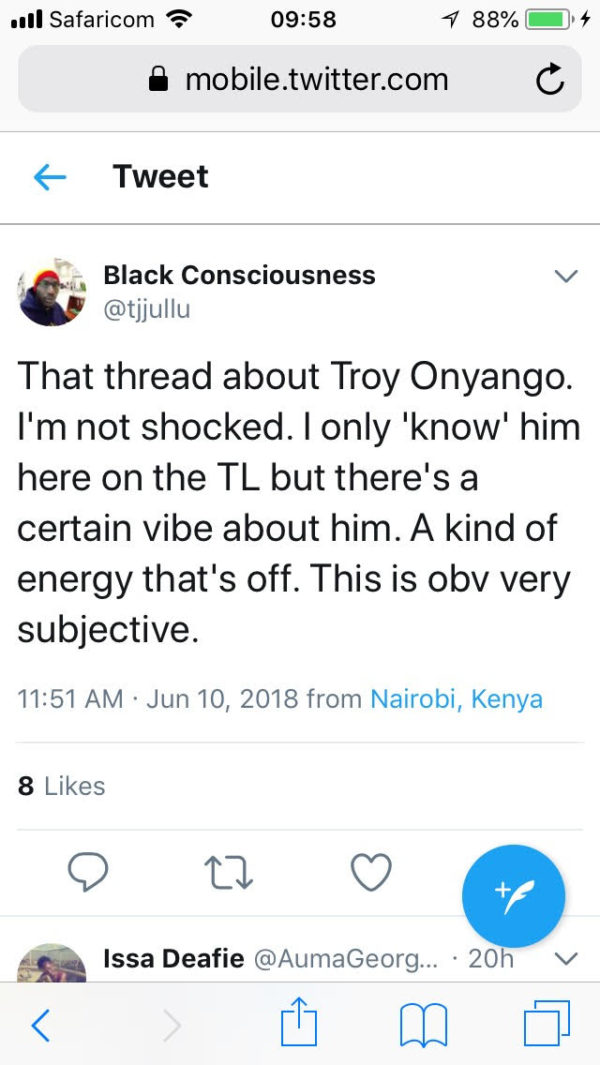
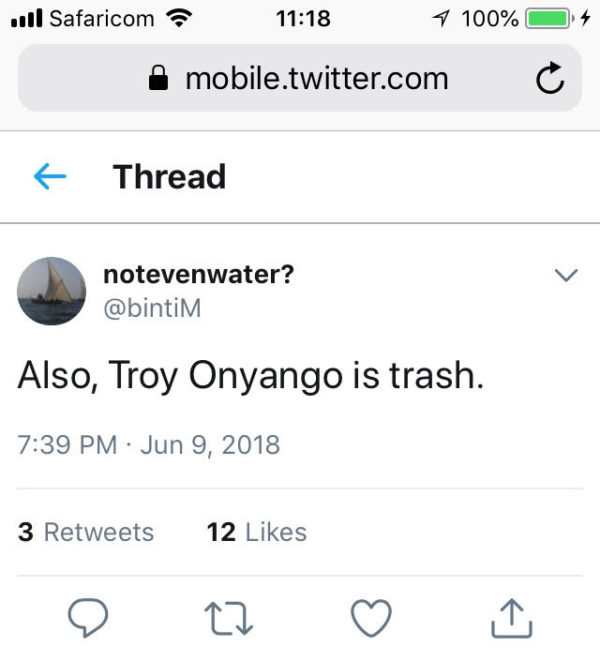
Way Forward
Between the time I “left” Enkare Review and now, I have finished my novel, signed with an agent, received two offers of publication from publishers, and I have been trying to move my career to the level of the African writers I have admired since I was a child. None of these are as a result of Enkare Review but of the hours and hours I put into my personal work. I have no intention to bring any ruin to my reputation or that of Enkare Review. I respect everyone who has made a contribution towards getting the magazine to where it is. I would never do anything to compromise the quality of the work posted there. As a writer myself, I would hate to have my work interfered with in the midst of differences between the people responsible for the magazine. What we have here is an unfortunate series of misunderstandings that have culminated due to non-communication or a deliberate sabotage of any attempt at a resolution. I would be the last to want to sabotage Enkare Review as I consider it a highlight of everything good. An idea that came from a moment of purity and altruism. It is my hope that the other guys open their communication channels so that we can resolve this and work on a way forward. Enkare Review is an important space and shouldn’t be allowed to crumble.

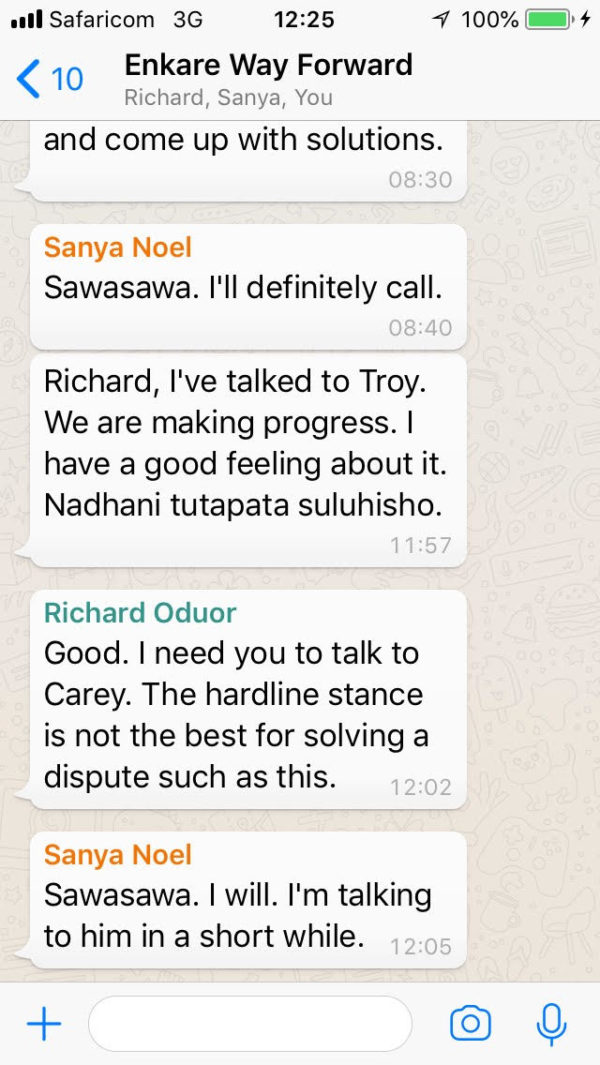
___________________________________________________________________________
The Brittle Paper Position
The literary space in Africa is one still developing, through the hardwork of individuals, the hardwork of collectives and groups, through collaborations, through social media as a networking tool. We are unhappy that circumstances did not let our colleagues at Enkare Review, an institution occupying an important cultural space, to work through this in private, through external mediation and sustained negotiation. It is our hope that this is resolved soonest.


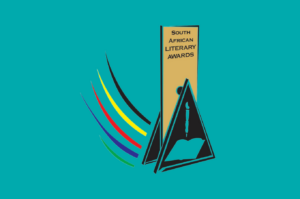
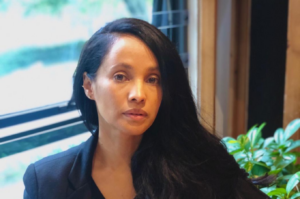
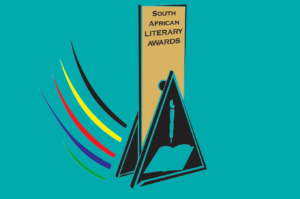
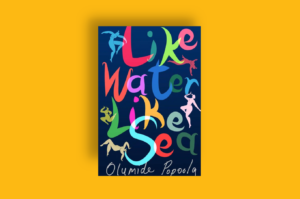
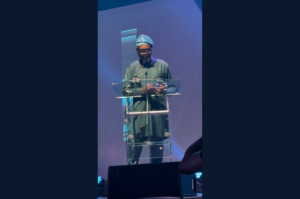


Rick Sanchez June 11, 2018 14:19
Troy, Carey and Sanya, work this thing out, guys. Not cool. I have read Troy's statement and Enkare's statement, and while I thought that the Caine Prize shortlist was the worst thing that could have possibly happened to literature this year, this story is now a close second.